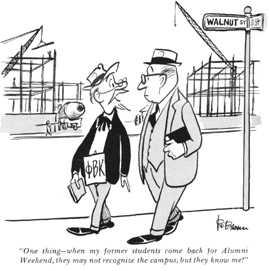
A Chronicle of Campus Changes Through One Absent Mind
By Susan Frith Lonkevich
An oversized Phi Beta Kappa key dangled from his waist, regardless of the occasion. His briefcase bore the monogram I.Q. And no matter how much fashions changed, he always sported a pointy beard, an upright sprig of hair atop his balding head, and a floppy bow tie. Though it wasn’t clear which academic discipline he was trained in, he assured his department chair that he had indeed published: two letters to The Philadelphia Inquirer and one to Ann Landers.
For 25 years the cartoon character known as Professor Quagmire livened the pages of the Gazette with his quirks, confusion, and misadventures. The creation of Robert F. “Bo” Brown Sr. C’28 L’31, Quagmire showed up for the Ivy Day Planting Ceremony with poison ivy and bandaged hands. He dressed for Evening School in a tuxedo. He tried to tell winning football Coach George Munger how to do his job and got dragged onto the field in perhaps the smallest football jersey ever made.
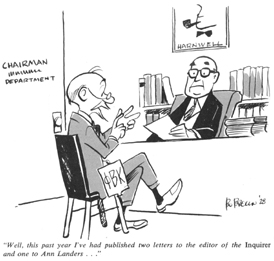
“I guess he was supposed to be the absent-minded professor, although he was pretty much on top of things if you read the cartoons,” recalls Michel Huber W’53 ASC’61, former publisher of the Gazette and director of alumni relations, as well as a friend of the late cartoonist. “The cartoons are always relevant to the University and what was going on” at the time.
From 1946 to 1971, the cartoon observed the return of World War II veterans to campus, the admission of women to Wharton, the election of the first woman student-council president, and protests against the Vietnam war.
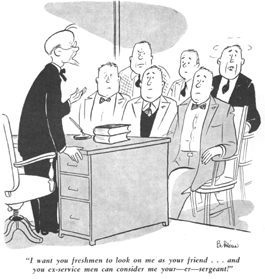
Brown’s cartooning career began while at Penn’s Law School, when he submitted a cartoon to the Saturday Evening Post. The magazine bought the cartoon for $35. After selling a second piece, Brown took a leave of absence from law school to devote his time to drawing cartoons. He went on to publish thousands of them internationally until his death at age 90 in 1996.
“He was delightful to work with,” says Robert M. “Dusty” Rhodes, editor of the Gazette from 1961 to 1971, adding, “He gave the magazine a certain characteristic most of the other magazines didn’t have. No other alumni magazine I knew of had a regular cartoonist who dealt with things going on on campus.”
While popular with many alumni, the professor’s stance on the generation gap didn’t endear him to everyone. When a gaggle of shaggy-bearded young men paraded by him with anti-war signs, an indignant Quagmire remarked to a colleague: “Sometimes I feel like shaving off mine in protest!”
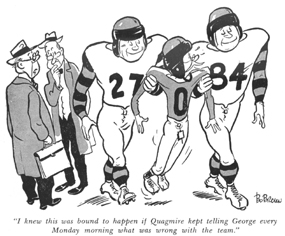
That cartoon generated at least one angry letter to the editor. “Unless or until you begin serious consideration in the Gazette of the issues facing our nation,” wrote Joseph Schwab C’61, “your cartoon says to me that your view of the issues is: Beards are of more concern than bombs, burning draft cards is of more concern than the burning of people, peace is dangerous, and democracy must be brought to Vietnam by compelling our young men to go there and fight.”
Huber says he thinks the letter writer misunderstood the intent of the cartoon. “He was poking fun at people growing beards, but it cut both ways. I think that remark was also kind of a jibe at people who couldn’t stand students with long hair and beards.”
“Bo was very much a traditionalist and a conservative, I think, but yet he was able to accept the changes.” Huber recalls how Brown, an officer in the Friars Senior Society, welcomed women to the group once its membership opened up to them. “He was kind of like an uncle to them. He didn’t like to see things change, but when they did change, he accepted it and went along with it, and ended up enjoying it.”
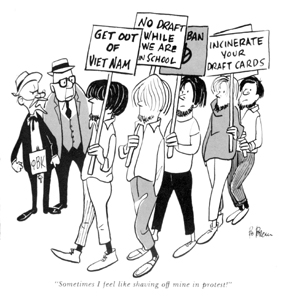
Brown’s active involvement in Penn alumni affairs helped him keep the cartoon topical. “A lot of active alumni take [their volunteer work] very seriously like it’s another job, but Bo just enjoyed it,” Huber says. “He liked being around other people.”
So prolific was Brown that he used cartoons to communicate the most mundane of messages. When he lost the red and blue rosette that was given to him upon receipt of the Alumni Award of Merit, he mailed Huber—then still the director of alumni relations—a cartoon.
Recalls Huber: “There was a picture of Bo down on his hands and knees looking under his desk, with his wife standing behind him. He was saying to her, ‘I guess I’m going to have to ask Mike Huber to send me a new one.’ That probably took him no longer [to draw] than it would take me to write a note.”

